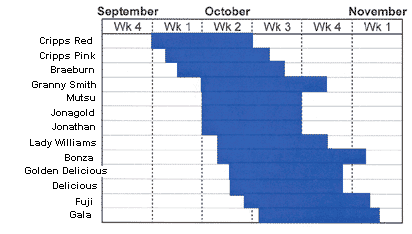
Apple varieties
Introduction
Apples are one of the oldest and most popular fruit worldwide, due to their juiciness, crispness, flavour and eye appeal. However, there are fashions with apple varieties just as with everything else, and there have been significant changes in the range of commercially acceptable apple varieties, particularly over the last 30 years.
Apple growers at the beginning of the twentieth century grew around 15–20 different varieties that were harvested and marketed in sequence 1–2 weeks apart. This was due in part to a lack of storage facilities and to poor keeping qualities of the fruit, necessitating immediate sale. However, this marketing system and the range of varieties changed dramatically during the 1950s as more growers installed coolrooms, allowing for longer marketing periods of up to 6–8 months after harvest.
During the 1960s, a revolution occurred with the introduction of more advanced cool storage techniques matched with superior strains of Red Delicious, allowing for marketing over 12 months. Many of the older varieties disappeared from the commercial scene.
In more recent years Red Delicious, although still the most commonly planted variety worldwide, is being replaced by new varieties such as Fuji and Cripps Pink, as apple breeders seek to tempt consumers with new varieties.
Apple varieties do change over time as new ones become popular and older varieties either are no longer in demand or become unprofitable to produce. However, there is still room for some older, less popular varieties that have reduced demand, but these can no longer be produced for large markets such as supermarkets — they can be grown for roadside stalls and for discerning consumers.
Commercial varieties in NSW
*Cripps Pink apples of an appropriate quality may be sold using the trademarked brand name Pink LadyTM.
**Cripps Red apples of an appropriate quality may be sold using the trademarked brand name SundownerTM.
Flowering dates
Table 1 compares the flowering time for a range of varieties, based on the climatic conditions in Orange, NSW. The sequence of flowering will be similar for most other districts, but may commence either earlier or later in spring.
Table 1. Apple variety flowering dates

Maturities
| Early | Mid-early | Mid-season | Late | Very late |
|---|---|---|---|---|
Resistances and susceptibilities to pests and disease
| Fireblight | Scab | Mildew | Virus | Woolly aphid | |
|---|---|---|---|---|---|
| Gravenstein Jerseymac Summerred |
S MS – |
S S MS |
MS – MR |
S – – |
S S S |
| Gala Prima Priscilla William’s Pride |
S MR MR MR |
MS R R R |
MS MR MR MR |
– – – – |
S S – – |
| Jonathan Jonagold Delicious Bonza Golden Delicious |
S S MR – MR |
MR S S R MS |
S S MR S S |
MS – MR – MS |
MR S S MR S |
| Granny Smith Braeburn Fuji Mutsu Querina Florina |
MS S S – R |
MS S R S R |
S S MR MR MS |
MS – – – – |
MS S S S – |
| Cripps Pink Cripps Red Lady Williams |
S S S |
S S MS |
S MR MS |
– – – |
S S S |
Key: S = susceptible MS = moderately susceptible MR = moderately resistant R = resistant – = unknown

